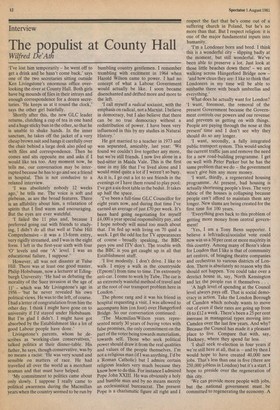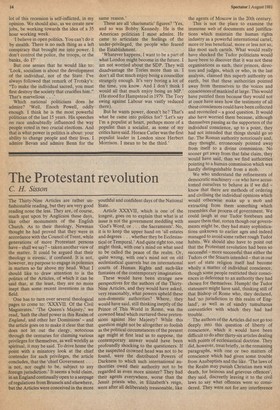Interview
The populist at County Hall
Wilfred De'Ath
'I've lost him temporarily — he went off to get a drink and he hasn't come back,' says one of the two secretaries sitting outside Ken Livingstone's enormous office overlooking the river at County Hall. Both girls have big mounds of files in their intrays and enough correspondence for a dozen secretaries. 'He keeps us at it round the clock,' says the other girl balefully.
Shortly after this, the new GLC leader returns, clutching a cup of tea in one hand and a huge sticky bun in the other, so that he is unable to shake hands. In the inner sanctum, he takes off the jacket of a very cheap brown suit and hangs it carefully over the chair behind a large desk also piled up with files and correspondence. Then he comes and sits opposite me and asks if I would like tea too. Any moment now, he tells me, our conversation may be interrupted because he has to go and see a friend in hospital. This is not conducive to a relaxed interview.
'I was absolutely nobody 12 weeks ago,' he tells me. The voice is soft and plebeian, as are the broad features. There is an affability about him, a relaxation of spirits that I find warm and encouraging. But the eyes are ever watchful.
'I failed the 11 plus and, because I preferred going out with friends to studying, I didn't do all that well at Tulse Hill Comprehensive — it was a 13-form entry, very rigidly streamed, and I was in the eight form. I left in the first-year sixth with four '0' levels and one 'A' level. I was an educational failure, I suppose.'
However, all was not disaster at Tulse Hill. There was at least one good master, Philip Hobsbaum, now a lecturer at Edingburgh University: 'He had us debating the morality of the Suez invasion at the age of 11' — which was Mr Livingstone's age in 1956 — 'but he never revealed his own political views. He was to the left, of course. I had a letter of congratulation from him the other day. I think I might have gone on to university if I'd stayed under Hobsbaum. But I'm glad I didn't. I might have got absorbed by the Establishment like a lot of good Labour people have done.'
Livingstone's parents, whom he describes as 'working-class conservatives,' talked politics at their dinner-table. His father, he says, though conservative, was by no means a racist: 'He was very sound and sensible on matters of race. He had travelled all over the world as a merchant seaman and that must have helped.
`My commitment to politics came about only slowly. I suppose I really came to political awareness during the Macmillan years when the country seemed to be run by bumbling country gentlemen. I remember trembling with excitment in 1964 when Harold Wilson came to power. I had no concept of what a Labour Government would actually be like. I soon became disenchanted and drifted more and more to the left.
'I call myself a radical socialist, with the emphasis on radical, not a Marxist. I believe in democracy, but I also believe that there can be no true democracy without a redistribution of power. I have been very influenced in this by my studies in Natural History.'
He got married to a teacher in 1973 and was separated, amicably, last year: `We found we couldn't live together any more, but we're still friends. I now live alone in a bed-sitter in Maida Vale. This is the first time in my life that I've lived alone and I would mind quite a lot if I weren't so busy. As it is, I go out a lot to see friends in the evenings or I have them round to play pool: I've got a six-foot table in the bedsit. It takes up half the space.
'I've been a full-time GLC Councillor for eight years now, and during that time I've earned an average of just £70 per week. It's been hard going negotiating for myself £4,000 a year special responsibility pay, and I hope nobody will mind too much about that. I'm fed up with living on 70 quid a week. I get the odd fee for TV appearances of course — broadly speaking, the BBC pays you and ITV don't. The trouble with the BBC is you get caught up in all that Establishment stuff.
`I live modestly. I don't drive. I like to walk. I enjoy a walk in the countryside (Epsom!) from time to time. I'm extremely anti-car. I come to work by Tube. The car is an extremely wasteful method of travel and at the root of our transport problem here in London.'
The phone rang and it was his friend in hospital requesting a visit. I was allowed to accompany him (on foot) over Hungerford Bridge. So our conversation continued: 'The Macmillan/Wilson years represented nearly 30 years of buying votes with false promises, the only commitment on the part of the voter being towards materialism, towards self. Those who seek political power should draw it from the real qualities and values of the people themselves. I'm not a religious man (if I was anything, I'd be a Roman Catholic) but I admire certain religious leaders very much because they know how to do this. For instance I admired Pope John XXIII. He was obviously a holy and humble man and by no means merely an ecclesiastical bureaucrat. The present Pope is a charismatic figure all right and I respect the fact that he's come out of a suffering church in Poland, but he's no more than that. But I respect religion: it is one of the major fundamental inputs into humanity.
`I'm a Londoner born and bred. I think this is a wonderful city — slipping badly at the moment, but still wonderful. We've been able to preserve a lot. Just look at those little beaches down there' — we are walking across Hungerford Bridge now — 'and how clean they are: I like to think that Londoners in my time will be able to sunbathe there with beach umbrellas and everything.'
What does he actually want for London? 'I want, foremost, the removal of the present Government because the Government controls our powers and our revenue and prevents us getting on with things. People are paying through the nose at this present' time and I don't see why they should do so any longer.
'I want, secondly, a fully integrated public transport system. This would unclog the current traffic jam and remove the need for a new road-building programme. I get on well with Peter Parker but he has the same problem that we do — the government won't give him any more money.
`I want, thirdly, a regenerated housing programme. At present, bad housing is actually shortening people's lives. The very fabric of the houses is collapsing because people can't afford to maintain them any longer. New slums are being created for the first time for 100 years.
`Everything goes back to this problem of getting more money from central government!
'Yes, I am a Tony Benn supporter. I believe a left/radical/socialist vote could now win us a 50 per cent or more majOrity in this country. Among many of Benn's ideas for London that I like is that of community art centres, of bringing theatre companies and orchestras to various districts of London. There is absolutely no reason why this should not happen. You could take over a derelict house in, say, North Kensington and let the people run it themselves . . .
'A high level of spending at the Council level always pays off. That is social democracy in action. Take the London Borough of Camden which nobody wants to move out of even if their rates are going up from £6 to £12 a week. There's been a 25 per cent increase in managerial types moving into Camden over the last few years. And why? Because the Council has made it a pleasant place to live. Compare that with, say, Hackney, where they spend far less.
'I shall seek re-election in four years if we're still here at all, that is — and by then I would hope to have created 40,000 new jobs. That's less than one in five (there are 250,000 jobless in London) but it's a start. I hope to preside over the regeneration of this city. 'We can provide more people with jobs, but the national government must be committed to regenerating the economy. A lot of this recession is self-inflicted, in my opinion. We should also, as we create new jobs, be working towards the idea of a 35 hour working week.
'I believe in open politics. You can't do it by stealth. There is no such thing as a left conspiracy that brought me into power. I don't control the police, the troops, or the banks, do l?'
But one senses that he would like to: 'Look, socialism is about the development of the individual, not of the State. I've always followed that remark of Trotsky's: "To make the individual sacred, you must first destroy the society that crucifies him." That's marvellous . .
Which national politicians does he admire? 'Well, Enoch Powell, oddly enough. I think he is the most powerful politician of the last 15 years. His speeches on race undoubtedly influenced the way people voted in two crucial elections. And that is what power in politics is about: your ability to change people and their lives. I admire Bevan and admire Benn for the same reason.'
These are all 'charismatic' figures? 'Yes, and so was Bobby Kennedy. He is the American politician I most admire. He came to articulate the feelings of the under-privileged, the people who feared the Establishment.
Whatever happens, I want to be a part of what London might become in the future. I am not worried about the SDP. They will disadvantage the Tories more than us. I don't all that much enjoy being a councillor strangely enough. It's very boring a lot of the time, you know. And I don't think I would all that much enjoy being an MP.' (He stood for Hampstead in 1979. The Tory swing against Labour was vastly reduced there).
But he wants power, doesn't he? That's what he came into politics for? 'Let's say I'm a populist at heart, perhaps more of a populist than a socialist, as some of my critics have said. Horace Cutler was the first populist leader in London since Herbert Morrison. I mean to be the third.'



































 Previous page
Previous page